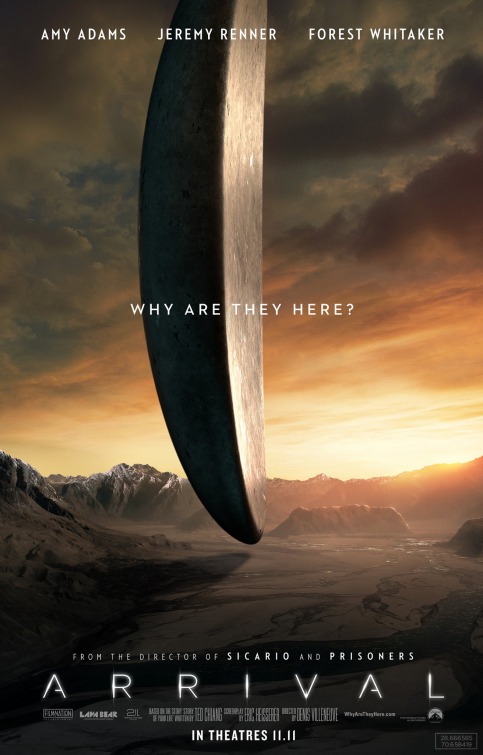Why Are They Here?
Director
Denis Villeneuve
Starring
Amy Adams
Jeremy Renner
Forest Whitaker
Michael Stuhlbarg
The opening scenes of Arrival introduce us to Louise Banks [Adams], detailing the start and end of her young daughter’s life as she succumbs to a rare disease. We then re-open on Louise’s day job as a linguist being interrupted by the arrival of twelve shell-like vessels dotted around the globe. The general waves of mass panic and joy are detailed through news reports as Louise stays separate from it all. Before long, she is approached by Colonel Weber [Whitaker] who enlists her help communicating with the creatures within said vessels. Banks explains that she can’t simply translate a completely unknown language based on a recording alone. She is then enlisted along with affable scientist Ian Donnelly [Renner] and escorted to the military base camp set up in close proximity to the shell. Their objective is clear, ascertain what the aliens want and if their intentions are hostile. But in order to do that, Louise must figure out a way to communicate with these beings.
Amidst the sheer wealth of terrible science fiction releases, every now-and-then, audiences are treated to a genuinely interesting and well executed film that impresses the eyes and stimulates the imagination. In the 1950s, the public stepped away from stories about cowboys roaming the frontier, favouring the frontiers of space. One film that really stood out for me was The Day The Earth Stood Still, which gave the audience the “space monster” they were braying for but also set out a clear message to work together or face ruination. Arrival feels very reminiscent of this kind of film; one that checks a lot of blockbuster tick-boxes but subverts expectations by delivering something simple, subtle and thought provoking. This is usually the modus operandi in Christopher Nolan films: a level of intelligence that is, in actuality, a very simple premise convoluted pleasingly and masqueraded as extremely clever. I’ll expand more on that in my highlighted scene below.
One of the standout elements is the acting. The characters themselves are your typical players present in a first contact science fiction film; the cautious but excitable scientists, the wary trigger-happy military, the duplicitous government officials and those pesky foreign powers and their differences of opinions. And yet, all of them are free from caricature while still adhering to the standard tropes, deliveries and motivations. It’s a very odd thing. This means that either the writing is strong enough that we accept these people as real, the visuals dazzle you enough that you don’t worry about it or they’re performed so well that you connect and want to spend time with these people. While all three are arguably accurate, the acting really stands out. Personally, I’m not the biggest fan of Adams or Renner. But I will openly admit that when they find a role that really suits them, they both excel masterfully: think Adams in Doubt or The Master and Renner in The Town. We also have Forest Whitaker and Michael Stuhlbarg giving understated but solid supports and then a large handful of unknowns punching at the same weight as the leads. All of which works together wonderfully to create a great experience void of any jarring anomalies.
As with any film featuring aliens, one of the key points is how they look, followed quickly by how they sound. The novice cinemagoer immediately chalks this up solely to makeup or CGI (which, admittedly, play a colossal factor) but things like cinematography, sound design and music are crucial. Because in order to believe the extraordinary, we have to be convinced of the ordinary first and there needs to be cohesion between the two. In other words, without Bradford Young’s dark, washed out, morose and cold cinematography, we can transition between the alien environment/narrative elements with ease. On top of that, after the release of Sicario, Jóhann Jóhannsson has proven he is more than capable of producing intensely foreboding, otherworldly harmonic scores. A steady mix of rhythmical breathing, guttural chants and hums; much in the same way that one of my favourite scores of all time is Shoji Yamashiro’s music for Akira. And only then, with this incredibly atmospheric and creepy setting, are we treated to the visual effects – which work almost all of the time, bar a few shots that flail a little, specifically the floating heads in the suits while the gravity shifts and the “underwater” hair.
**spoiler heavy paragraph**
Before closing this review, I’d like to discuss the concept. Any good science fiction isn’t just about the setting and the spectacle, it’s the concept that brings you back. But in order to do that, I need to detail some of the film’s key plot points and, ultimately, flaws. As such, there will be a host of spoilers within, consider yourself warned. The core concepts of this film are that a) memory, language and time are connected and b) the journey is worth it no matter the outcome. These concepts are presented most clearly during what most people would dub the twist. In truth, it’s less a twist and more an accusation for thinking in a certain way. As if the film itself serves you up a pie and when you are surprised by the filling, the film retorts “I said it was a pie, I didn’t specify meat or fruit. You made that assumption yourself.” Furthermore, the film openly says in the opening montage that stories don’t really have a start or an end and memory isn’t what you think. And yet, despite this clever Prestige style misdirection, like all good science fiction, Arrival has some really stupid stuff that survives because the necessity for emotional resonance trumps sense. This means we are left with some really pressing questions. Once the aliens reveal that their language can alter your brain chemistry and allow you to look into the future, they explain they are only here to trade with us in order to speed up our evolutionary process (in a manner of speaking) and return 3000 years in the future to help them. But what exactly do we need to do in 3000 years? It’s never expressly made clear. Are the aliens simply setting in motion an eventuality? Are they altering the course of the future? Can seeing the future mean we can alter it, so are we merely viewing it in the same way we “view” memories? If they can experience all time, why do they have to learn our language rather than just know it? I get the idea of not preventing the explosion (as this adds to the aforementioned “worth of the journey” itself, rather than just the outcome) but why the time limit to communicate with us? Why do they depart and not return for supposedly 3000 years? Furthermore, why go to the extent of creating a human-friendly airlock when we can miraculously survive their environment?
Most audiences won’t care about these plot holes and open ended issues but they are vital to understanding what the film is trying to say.. right up until the point you realise the alien element is incidental so that the primary focus of the story can be on the central messages of appreciating the time we have with the ones we love and working together as a species. Thus the film is a bit of a rarity, culminating with a hopeful optimistic tone, despite indulging in man’s worst traits of fear, mistrust, stupidity, division and selfishness. Or you won’t get that and you’ll say it’s boring, in which case, there is no help for you.
Release Date:
11th November 2016
The Scene To Look Out For:
I mentioned earlier the script’s Nolan-level of intelligence; meaning to appear smarter and more confusing than it actually is. That’s not an insult to this film or any of Nolan’s oeuvre but they are still trying to entertain as many people as possible, so still take several opportunities to translate to the audience. Where this didn’t really work in something like Interstellar (scientists who all understand the same concepts using basic analogies to detail their thoughts), it does here because you have three individuals at the top of their respective fields who need to convey complex thoughts to each other quickly and efficiently. Thus we end up with the kangaroo scene, in which Weber demands a reason for proceeding the way she is and Louise justifies it by saying that when explorers first got to Australia, they asked what the hopping creature was and the aborigines responded “kangaroo”. But kangaroo in their language means “I don’t understand.” This convinces the colonel who departs with a warning about what happened to the aborigines. Donnelly commends Louise for her quick thinking and she confesses the story is false but proves the point anyway. I really like this as it takes the standard science fiction trope, delivers it exactly as we’ve always experienced it but twists the end meaning while still saying the same thing. Overall, the whole exchange mirrors the plot itself and reinforces the importance of clear and concise communication – even with our own species, even with those who speak our own language.
Notable Characters:
Any time an actor you can’t stand makes you invest in a character, you know something special is happening. Either the director has brought something positive out of them or the character is best suited for their personality and acting style. Whatever it is, it highlights that no matter how much you dislike an individual, they can surprise you. I don’t know precisely what I distinctly dislike about Adams, possibly that I always feel like she’s acting and because I can tell that, it feels forced and takes me out of the film. I wouldn’t say she refrains from this at all here but it just works in the way it needs to.
Highlighted Quote:
“I’m curious.. are you dreaming in their language?”
In A Few Words:
“A strong, stylistic science fiction with a simple message immersed in a core component that could lose a lot of the audience. Either way, it’s a really solid release that deserves a lot of praise”
Total Score: 5/5
![The Red Right Hand Movie Reviews [Matthew Stogdon]](https://reviews.theredrighthand.co.uk/wp-content/uploads/2021/12/cropped-header1.png)




